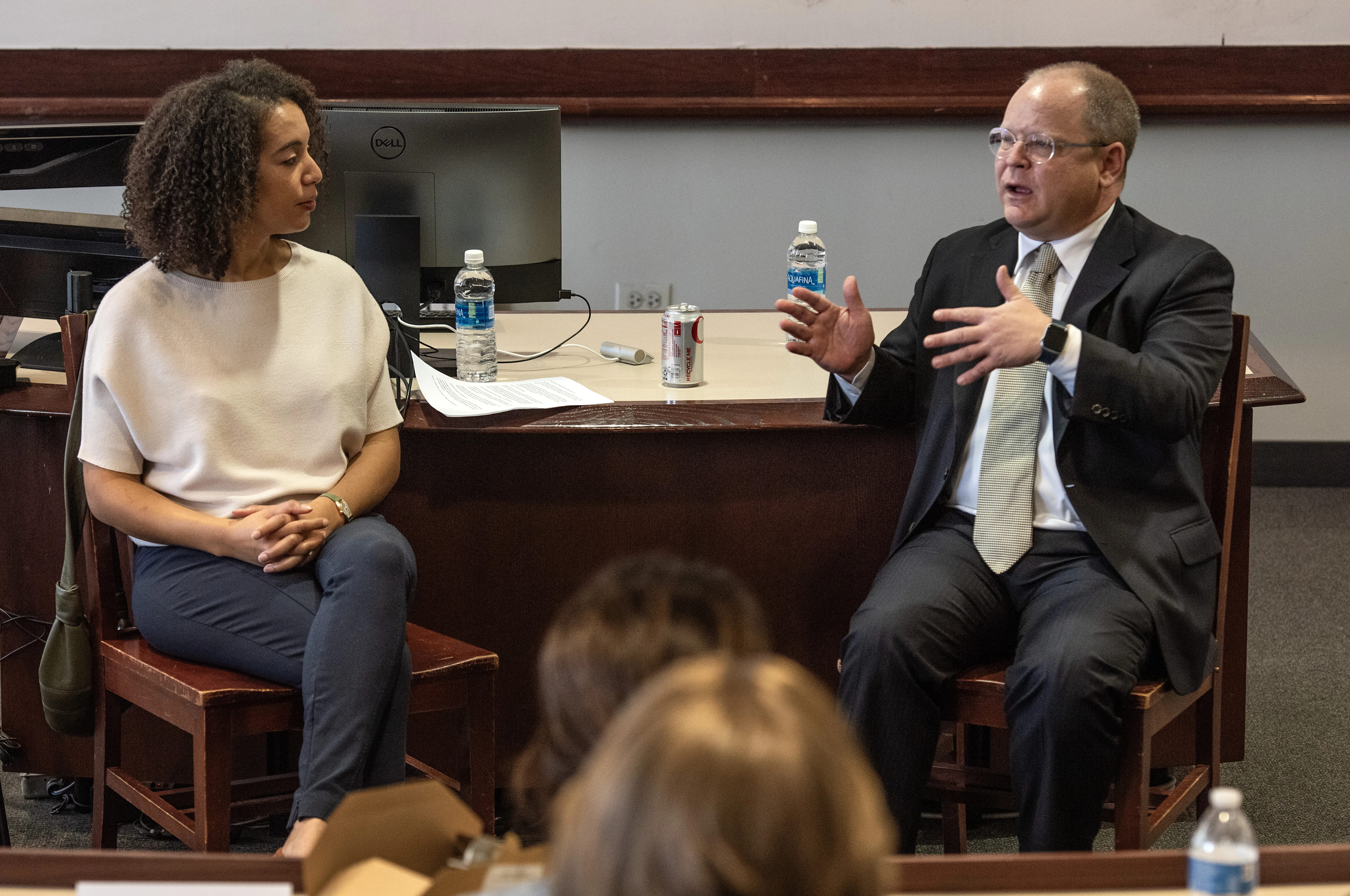Taking Down Robert E. Lee: Fourth Circuit Judge Toby Heytens on the Most Meaningful Case He Ever Litigated

“If I never litigate another case in my life, I am so glad that was the last case I ever litigated,” Fourth Circuit Judge Toby Heytens said of defending the Virginia Governor’s 2020 decision to take down the statue in Richmond commemorating Confederate General Robert E. Lee.
Two years into his tenure on the Fourth Circuit, Heytens visited the Law School as part of the Edward H. Levi Distinguished Visiting Jurist program. During his talk November 9, Heytens spoke to students about his upbringing, questioning assumptions, and his career “bouncing back and forth” between being a government litigator and law professor before joining the bench.
“Where we lived in Charlottesville was literally two blocks from the Robert E. Lee statue that was the epicenter of the Unite the Right Rally and eight blocks from the Stonewall Jackson statue that had an actual Klan rally. I don’t mean a metaphorical Klan rally, I mean the actual [Ku Klux] Klan,” Heytens said.
Although he loved teaching, those events made it easier for him to leave his position at the University of Virginia School of Law to become the Solicitor General of Virginia, a post he held from 2018 until his 2021 nomination to the Fourth Circuit by President Joe Biden.
During his talk, which was moderated by Professor Farah Peterson, Heytens reflected on what propelled his success. He grew up in Superior, Wisconsin, attending a high school where only a minority of students went on to attend college. He was motivated, he said, not by big dreams—but by fear of failure: “My goal as a fall semester 1L was to not do actively badly, because I was really afraid that might happen. Up until that point in my life, I had never worked as hard at anything.”
And succeed he did: after graduating from UVA Law School in 2000, Heytens first clerked for Chief Judge Edward Becker of the Court of Appeals for the Third Circuit and then Justice Ruth Bader Ginsburg of the US Supreme Court. Following a few years in private practice in D.C., Heytens worked at the Department of Justice’s Office of the Solicitor General until 2010, when he returned as a professor at UVA Law School.
“The fact that you’re all sitting in this room right now means you have a lot of options. And here’s the downside: the terrifying thing about having a lot of options is that at some point you actually have to decide what you want,” Heytens said. “This is not something that anybody else can decide for you. One of the greatest powers you have in shaping your early career is identifying things that you don’t care about.”
After realizing that talking to his sister for 12 minutes during a work day put him 12 minutes further from his billable hour targets, Heytens decided that private practice was not for him.
“I worked so many more hours in government jobs than I ever worked at a law firm. And what was weird is that I resented it so much less. I never once resented the late nights I spent working for the government.”
In particular, Heytens said he found his work defending the governor’s decision to remove the Robert E. Lee statue to be legally complicated, interesting, and fun—in addition to being something he cared about.
“It was the first time I thought about property [law] probably since spring semester 1L,” Heytens said. The monument sat on an island of state-owned land in the middle of a traffic circle, deeded with a covenant requiring the state to protect and maintain the statue. Furthermore, the city of Richmond owned the surrounding land. In addition to the property concerns, Heytens sorted through government speech issues and separation of powers questions.
In 2021, the Virginia Supreme Court unanimously ruled for the state government to proceed in removing the statue, with Heytens serving as lead counsel as Virginia’s Solicitor General.
In response to a question from Professor Peterson on how his thinking on race has evolved, Heytens shared that the Confederate monuments serve as an interesting example of his own thinking. Growing up in a small city in the upper Midwest, Heytens said he didn’t think about race much because “let’s be real, virtually every person I knew growing up was White.”
When he first came to Virginia in 1997 for law school, Heytens said he was confused by the Confederate monuments. “Why are we talking about the Civil War at all? And why are we talking about the losing side in particular?”
But over time, he got used to seeing the monuments. He started to accept that they were never going anywhere. He remembered thinking once: “I hope I’m still alive when they get taken down.”
Then all of a sudden, taking them down became a very real possibility. “Getting a call during the summer of 2020 and hearing the words ‘we’re going to take him down’ is one of my absolute core memories that’s seared into my brain.”
In discussing the paradigm shift that enabled the Robert E. Lee statue to come down, Heytens acknowledged the change that has occurred, but said he’s certain there’s plenty of changing left to do.
“The moment that one stops critically assessing things that one has assumed are true is the moment that one has stopped changing.” And that, Heytens said, is no good.
Eva Nobel is a member of the Class of 2025 at the Law School. Eva grew up in St. Louis, Missouri and graduated from Vanderbilt University in 2020. Before law school, she worked at a plaintiffs’ law firm in St. Louis. At the Law School, Eva is involved with Law Women’s Caucus and The Legal Forum, a student-led journal.
